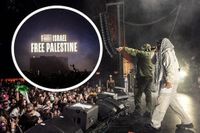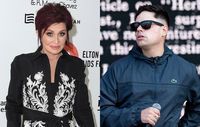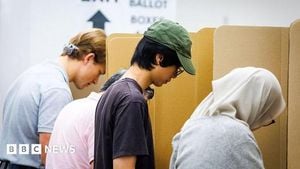In a dramatic turn of events, Sharon Osbourne has called for the revocation of the US work visas held by the Irish rap group Kneecap, following their politically charged performance at the Coachella music festival. This call comes in light of the group's outspoken pro-Palestinian messages that resonated throughout their set, which has sparked a significant backlash from various quarters.
Kneecap, known for their provocative lyrics and support of Irish republican themes, performed at Coachella over the past weekend, where they ended their set with bold statements projected on large screens. These included messages like: "Israel is committing genocide against the Palestinian people," and "It is being enabled by the US government who arm and fund Israel despite their war crimes." The final screen bore the message, "F*** Israel. Free Palestine." This performance was particularly notable as it came shortly after Hamas launched a deadly attack on Israel on October 7, 2023, which resulted in the deaths of approximately 1,200 people, primarily civilians, and a subsequent Israeli military response that has reportedly claimed over 51,240 Palestinian lives.
Osbourne, a prominent television personality and judge on "America's Got Talent," expressed her outrage on social media, stating that Kneecap had "taken their performance to a different level by incorporating aggressive political statements." She urged her followers to advocate for the revocation of the band's work visas, emphasizing that the festival's organizers, Goldenvoice, should have been aware of the band's political intentions before allowing them to perform again after their initial set.
The Coachella festival, which attracts a wide array of artists and fans from around the world, has faced criticism for allowing artists to use their platform for political expression. Osbourne lamented that the festival had compromised its "moral and spiritual integrity" by permitting such displays, asserting that music should serve as an escape from the world's unrest rather than a stage for political discourse.
In her statement, Osbourne highlighted the importance of music as a unifying force, stating, "While festivals like Coachella showcase remarkable talent from around the globe, music's primary purpose is to unite people. It should not be a venue for promoting terrorist organizations or spreading hate." She added that the performance raised concerns about the appropriateness of Kneecap's participation in such a festival.
During their performance, Kneecap's frontman, Mo Chara, drew parallels between the plight of the Palestinians and the historical struggles of the Irish, saying, "The Irish not so long ago were persecuted at the hands of the Brits, but we were never bombed from the... skies with nowhere to go. The Palestinians have nowhere to go." This sentiment was echoed by their audience, who participated in chants of "Free, free Palestine." The band's actions have sparked a fierce debate about the role of artists in political discourse, particularly in the context of a festival that has historically celebrated diverse musical expressions.
The controversy surrounding Kneecap's performance has not only drawn the ire of Osbourne but also that of Conservative Party leader Kemi Badenoch. Badenoch criticized the band for "openly glorifying evil terror groups" during their Coachella sets. This renewed tension comes after Kneecap previously won a legal case against the government regarding funding they were denied, which Badenoch had initially blocked.
In response to the backlash, a spokesperson for the US State Department stated that they do not typically comment on specific visa cases due to privacy considerations. However, they noted that the Department evaluates visa revocations based on any new information that may indicate a potential threat to public safety or conduct inconsistent with visa classifications.
Furthermore, the organizers of the Nova Music Festival in Israel, which was the site of a tragic Hamas attack resulting in numerous casualties, issued a statement expressing that Kneecap's messaging had "deeply hurt many in our community." They invited the band to visit an exhibition dedicated to the victims of the attack, aiming to foster understanding and connection rather than further division.
As the debate continues, Osbourne's call for the revocation of Kneecap's visas has ignited discussions about free speech, the responsibilities of artists, and the intersection of music and politics. Critics of Osbourne's stance, including some fans and fellow artists, argue that music should remain a platform for all voices, even those that challenge prevailing narratives.
In the wake of this controversy, Kneecap remains scheduled to perform at multiple shows across the US and Canada in the coming months. Their supporters argue that their artistic expression is a vital part of the conversation surrounding global issues, while detractors contend that their messages are inflammatory and detrimental to the cultural fabric of music festivals.
Ultimately, the unfolding situation illustrates the complexities of artistic expression in a politically charged environment, as well as the potential consequences that can arise from intertwining music with activism. As Kneecap prepares for their upcoming performances, the implications of their Coachella set will likely resonate far beyond the festival grounds.









